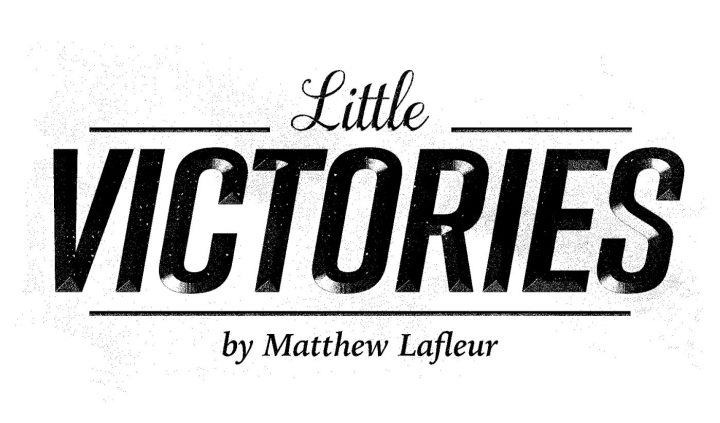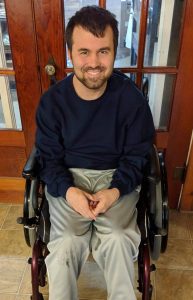Sometimes FA Makes Me Want to Be Invisible
Written by |

 Sometimes we prefer not to be seen. I know how that feels. Growing up, I loved being almost invisible, whether I was pretending to be a spy or playing one of my favorite games with my cousins, hide-and-seek in the dark. I liked the idea of blending into the shadows, losing my body — at least for a moment — and becoming one with the surroundings.
Sometimes we prefer not to be seen. I know how that feels. Growing up, I loved being almost invisible, whether I was pretending to be a spy or playing one of my favorite games with my cousins, hide-and-seek in the dark. I liked the idea of blending into the shadows, losing my body — at least for a moment — and becoming one with the surroundings.
Socially, I tend to echo this; it’s clear that I’m not comfortable being the center of attention. I prefer to live on the periphery, and it seems that’s always been the case.
But I don’t blame my preference for staying away from the center of attention, my abhorrence of being the life of the party, entirely on my social tendencies — not even mostly. As my Friedreich’s ataxia (FA) became increasingly visible and symptomatic in my day-to-day life, it made me stand out. I couldn’t hide in the shadows when it took all of my effort to get to my next class without falling. I couldn’t easily play the part of a wallflower at high school dances as I awkwardly stayed leaning against a wall, even after the roaming herd of my classmates migrated elsewhere, leaving me — obviously — alone. This was opposite of the subtlety I craved.
The Friedreich’s Ataxia News forums are a place to connect with other patients, share tips and talk about the latest research. Join today!
I hated FA. I still do, as it is the appropriate reaction to a lethal disorder; but back then, that hatred was more than that. It was irrevocably linked with shame. I was ashamed that FA made me stand out in a crowd, that it made me needier than most. After high school, when I transitioned to a wheelchair, I’d arrive early to my college classes. I’d park my wheelchair and transfer to the seat of an ordinary desk in the classroom. I know now that there is a therapeutic benefit to doing as much physical activity outside of sitting in a wheelchair as you can. But I was not thinking of the therapeutic benefit. I thought that by not sitting in my wheelchair, I could more easily blend in with the rest of the class.
Linking shame and disability is a terrible, but normal, consequence of life with special needs. I fight bitterly against this concept overall, but when I’m alone and frustrated, it’s easy to see my limitations as personal failings.
I know that’s wrong. I know that’s illogical. But it’s there: an aggravating voice in my head that I’m trying to quiet.
***
I was about to brush my teeth and get ready for bed a few nights ago when my phone rang. I reached for where it usually rests, beside the seat cushion on my wheelchair, and saw on the screen that it was Kyle, one of my best friends. I answered the phone, and we chatted for a bit. Kyle Bryant is probably the most well-known person with FA and a superstar in all that he does. I’m not much for talking on the phone — my calls tend to be brief — but I love checking in with my good friends now and then.
Our conversation centered around our current goings-on. The Two Disabled Dudes Podcast came up during our chat. The podcast that Kyle co-hosts along with our friend Sean Baumstark, another person with FA, focuses on how best to navigate life with disability, told by two guys with disabilities. I occasionally help them with writing their episode notes.
Kyle amazes me by broadcasting his speech when the struggle to speak clearly is one of the most prominent symptoms of FA. I tend to avoid recording my voice. Maybe it’s a combination of wanting to be invisible (inaudible?) and some stupid shame I still encounter with my disability. But I think that’s a strength of Kyle’s: broadcasting his voice for the good of others, regardless of his insecurities.
On our phone call, Kyle mentioned off-handedly that the 2DD podcast on Instagram sent me a birthday wish. (He is sneaky like that.) I hadn’t seen it because I’m not very active on Instagram. I am not a very picture-oriented guy. I’m not a big fan of taking pictures without someone else in the frame with me. I especially hate selfies; part of me still doesn’t like to be seen in my wheelchair.
I know that is stupid. If someone else told me that, I’d tell them how ridiculous that way of thinking is. People who use wheelchairs should not be ashamed; they should not be invisible. As a person, by default, you are worthy of love, despite — and even because of — your brokenness. Maybe it’s time for me to take my own advice.
I may require a wheelchair to get around. I may not speak as clearly as I’d like, but I am trying to be an OK person and to be OK with myself.
You deserve to be seen, and maybe I do as well.
***
Friedreich’s Ataxia News is strictly a news and information website about the disease. It does not provide medical advice, diagnosis or treatment. This content is not intended to be a substitute for professional medical advice, diagnosis, or treatment. Always seek the advice of your physician or another qualified health provider with any questions you may have regarding a medical condition. Never disregard professional medical advice or delay in seeking it because of something you have read on this website.




Ellee Peroni
I have read with great interest the testing or treatment of the HIV drug for FA. Tell me more about it? Where are they doing this testing? What will it cost,if it is already in the system? Thank YOU EP. Wheeling, W VA.